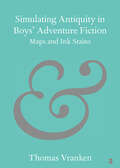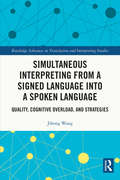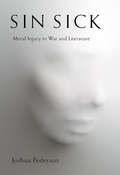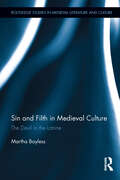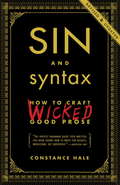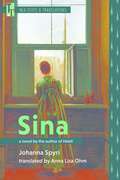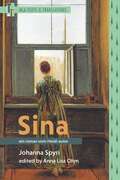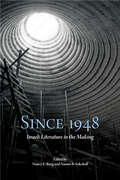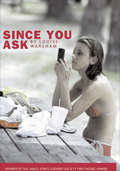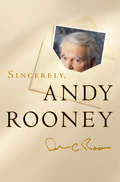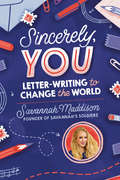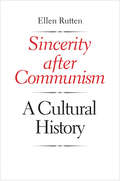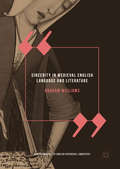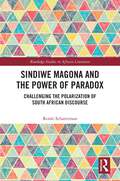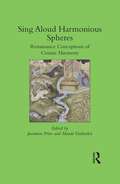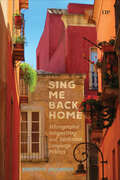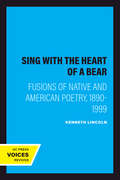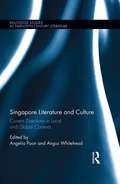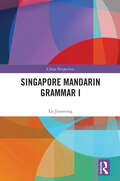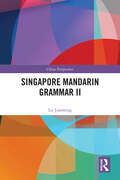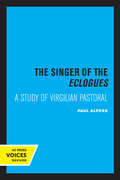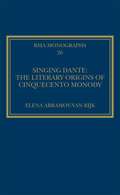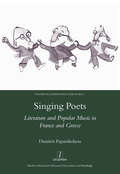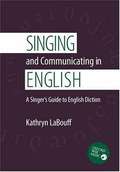- Table View
- List View
Simulating Antiquity in Boys' Adventure Fiction: Maps and Ink Stains (Elements in Publishing and Book Culture)
by Thomas VrankenA genre that glorifies brutish masculinity and late Victorian imperialism, boys' 'lost world' adventure fiction has traditionally been studied for its politically problematic content. While attuned to these concerns, this Element approaches the genre from a different angle, viewing adventure fiction as not just a catalogue of texts but a corpus of books. Examining early editions of Treasure Island, King Solomon's Mines, and The Lost World, the Element argues that fin-de-siècle adventure fiction sought to resist the nineteenth-century industrialisation of book production from within. As the Element points out, the genre is filled with nostalgic simulations of material anachronisms – 'facsimiles' of fictional pre-modern paper, printing, and handwriting that re-humanise the otherwise alienating landscape of the modern book and modern literary production. The Element ends by exploring a subversive revival of lost world adventure fiction that emerged in response to ebooks at the beginning of the twenty-first century.
Simultaneous Interpreting from a Signed Language into a Spoken Language: Quality, Cognitive Overload, and Strategies (Routledge Advances in Translation and Interpreting Studies)
by Jihong WangThis book examines conference-level simultaneous interpreting from a signed language into a spoken language, drawing on Auslan (Australian Sign Language)-to-English simultaneous interpretation data to explore the skills, knowledge, strategies, and cognitive abilities needed for effective interpretations in this language direction. As simultaneous interpreting from a spoken language into a signed language is the widely accepted norm within the field of signed language interpreting, to date little has been written on simultaneous interpreting in the other language direction. In an attempt to bridge this gap, Wang conducts microanalysis of an experimental corpus of Auslan-to-English simultaneous interpretations in a mock conference setting to investigate different dimensions of quality assessment, interpreting strategies, cognitive load, and the interpreting process itself. The focus on conference-level simultaneous interpreting not only allows for insights into the impact of signed language variation on the signed-to-spoken language simultaneous interpreting process but also sheds light on the unique demands of conference settings such as the requirement of using a formal register. Acting as a bridge between spoken language interpreting studies and signed language interpreting studies and highlighting implications for future research on simultaneous interpreting of other language combinations (spoken and signed), this book will be of interest to scholars in translation and interpreting studies as well as active practitioners in these fields.
Sin Sick: Moral Injury in War and Literature
by Joshua PedersonIn Sin Sick, Joshua Pederson draws on the latest research about identifying and treating the pain of perpetration to advance and deploy a literary theory of moral injury that addresses fictional representations of the mental anguish of those who have injured or killed others. Pederson's work foregrounds moral injury, a recent psychological concept distinct from trauma that is used to describe the psychic wounds suffered by those who breach their own deeply held ethical principles.Complementing writings on trauma theory that posit the textual manifestation of trauma as absence, Sin Sick draws argues that moral injury appears in literature in a variety of forms of excess. Pederson closely reads works by Dostoevsky (Crime and Punishment), Camus (The Fall), and veterans of the wars in Iraq and Afghanistan (Brian Turner's Here, Bullet; Kevin Powers' The Yellow Birds; Phil Klay's Redeployment; and Roy Scranton's War Porn), contending that recognizing and understanding the suffering of perpetrators, without condoning their crimes, enriches the experience of reading—and of being human.
Sin and Filth in Medieval Culture: The Devil in the Latrine
by Martha BaylessThis important new contribution to the history of the body analyzes the role of filth as the material counterpart of sin in medieval thought. Using a wide range of texts, including theology, historical documents, and literature from Augustine to Chaucer, the book shows how filth was regarded as fundamental to an understanding of human history. This theological significance explains the prominence of filth and dung in all genres of medieval writing: there is more dung in theology than there is in Chaucer. The author also demonstrates the ways in which the religious understanding of filth and sin influenced the secular world, from town planning to the execution of traitors. As part of this investigation the book looks at the symbolic order of the body and the ways in which the different aspects of the body were assigned moral meanings. The book also lays out the realities of medieval sanitation, providing the first comprehensive view of real-life attempts to cope with filth. This book will be essential reading for those interested in medieval religious thought, literature, amd social history. Filled with a wealth of entertaining examples, it will also appeal to those who simply want to glimpse the medieval world as it really was.
Sin and Syntax: How to Craft Wicked Good Prose
by Constance HaleToday's writers need more spunk than Strunk: whether it's the Great American e-mail, Madison Avenue advertising, or Grammy Award-winning rap lyrics, memorable writing must jump off the page. Copy veteran Constance Hale is on a mission to make creative communication, both the lyrical and the unlawful, an option for everyone.With its crisp, witty tone, Sin and Syntax covers grammar's ground rules while revealing countless unconventional syntax secrets (such as how to use--Gasp!--interjections or when to pepper your prose with slang) that make for sinfully good writing. Discover how to:*Distinguish between words that are "pearls" and words that are "potatoes"* Avoid "couch potato thinking" and "commitment phobia" when choosing verbs* Use literary devices such as onomatopoeia, alliteration, and metaphor (and understand what you're doing)Everyone needs to know how to write stylish prose--students, professionals, and seasoned writers alike. Whether you're writing to sell, shock, or just sing, Sin and Syntax is the guide you need to improve your command of the English language.From the Trade Paperback edition.
Sina: A Novel by the Author of Heidi (Texts and Translations #32)
by Johanna SpyriJohanna Spyri, best known for her iconic Heidi, sends another young heroine into the world, this time to face the challenges of adulthood and professional life. Sina Normann leaves her close-knit alpine community to become one of the first women to attend medical school at the University of Zürich. Along her chosen path she must confront her family's fears, her instructors' prejudices, and the demands of her own heart. Published not long after women were first admitted to the University of Zürich, the novel is one of the first works in German to present female students seriously rather than as objects of humor. In her introduction, Anna Lisa Ohm argues that Sina may have been intended as a sequel to Heidi.
Sina: Ein Roman vom Heidi-Autor (Texts and Translations #32)
by Johanna SpyriJohanna Spyri, best known for her iconic Heidi, sends another young heroine into the world, this time to face the challenges of adulthood and professional life. Sina Normann leaves her close-knit alpine community to become one of the first women to attend medical school at the University of Zürich. Along her chosen path she must confront her family's fears, her instructors' prejudices, and the demands of her own heart. Published not long after women were first admitted to the University of Zürich, the novel is one of the first works in German to present female students seriously rather than as objects of humor. In her introduction, Anna Lisa Ohm argues that Sina may have been intended as a sequel to Heidi.
Since 1948: Israeli Literature in the Making (SUNY series in Contemporary Jewish Literature and Culture)
by Nancy E. Berg; Naomi B. Sokoloff2021 CHOICE Outstanding Academic TitleToward the end of the twentieth century, an unprecedented surge of writing altered the Israeli literary scene in profound ways. As fresh creative voices and multiple languages vied for recognition, diversity replaced consensus. Genres once accorded lower status—such as the graphic novel and science fiction—gained readership and positive critical notice. These trends ushered in not only the discovery and recovery of literary works but also a major rethinking of literary history. In Since 1948, scholars consider how recent voices have succeeded older ones and reverberated in concert with them; how linguistic and geographical boundaries have blurred; how genres have shifted; and how canon and competition have shaped Israeli culture. Charting surprising trajectories of a vibrant, challenging, and dynamic literature, the contributors analyze texts composed in Hebrew, Yiddish, and Arabic; by Jews and non-Jews; and by Israelis abroad as well as writers in Israel. What emerges is a portrait of Israeli literature as neither minor nor regional, but rather as transnational, multilingual, and worthy of international attention.
Since You Ask
by Louise WarehamFrom a Connecticut sanitarium, 24-year-old Betsy Scott tells her doctor a story about the destructive secrets in an outwardly successful family. Confusing love and sex, desire and fear, Betsy grows alienated, confused and desperate. She finally faces truths about herself and her family that enable her to move beyond them and into a new life. Since You Ask is about the origins of sexual compulsion, and the ways in which one young woman tries to overcome it.Louise Wareham grew up in Manhattan and graduated from Columbia University. She has worked as a reporter in New York City, Oxford, Mississippi and New Zealand. Since You Ask was the winner of the James Jones Literary Society First Novel Award.
Sincerely, Andy Rooney
by Andy RooneyAndy Rooney's weekly commentaries on 60 Minutes and his twice-weekly syndicated newspaper columns-addressing everything from deceptive cereal packaging to the existence of God-have made him America's best-known critic of the quotidian. As you might imagine, he gets a lot of letters in response to his often iconoclastic views. As you might not expect, he writes a lot of letters, too. Now Rooney has collected the funniest, wisest, and most interesting of his letters, spanning several decades and addressing issues both momentous and trivial. He responds to complaints from viewers; he corresponds with old friends; and he writes to his children about the things he cares about most. Variously caustic, hilarious, and sage, these unfailingly entertaining letters reveal not only Rooney the iconoclast but Rooney the American Everyman. Sincerely, Andy Rooney is Andy Rooney at his best-and a wonderful gift book that will make readers chuckle and think twice.
Sincerely, YOU: Letter-Writing to Change the World
by Savannah MaddisonA letter can brighten a day, change a life, even unite the world--and so can you! <P><P>Have you ever missed a friend who lives far away and wished you could bring them back home? Do you know someone who could use a smile and have just the right story to brighten their day? Maybe you have a great idea to make your school better for everyone but don't know how to share it. With a letter, you can connect with friends and feel heard. Your stories, art, music, and ideas can travel near and far to make a difference! Packed with tips on how to conquer writer's block, find your own creativity, and connect with your friends, family, and community, this book will inspire you--and help you inspire the world around you!
Sincerity after Communism: A Cultural History
by Ellen RuttenA compelling study of "new sincerity" as a powerful cultural practice, born in perestroika-era Russia, and how it interconnects with global social and media flows The global cultural practice of a "new sincerity" in literature, media, art, design, fashion, film, and architecture grew steadily in the wake of the Soviet collapse. Cultural historian Ellen Rutten traces the rise and proliferation of a new rhetoric of sincere social expression characterized by complex blends of unabashed honesty, playfulness, and irony. Insightful and thought provoking, Rutten's masterful study of a sweeping cultural trend with roots in late Soviet Russia addresses postsocialist, postmodern, and postdigital questions of selfhood. The author explores how and why a uniquely Russian artistic and social philosophy was shaped by "cultural memory, commodification, and mediatization," and how, under Putin, "new sincerity" talk merges with transnational pleas to "revive sincerity. " This essential study stands squarely at the intersection of the history of emotions, media studies, and post-Soviet studies to shed light on a new cultural reality--one that is profoundly affecting creative thought, artistic expression, and lifestyle virtually everywhere.
Sincerity in Medieval English Language and Literature (New Approaches To English Historical Linguistics Ser.)
by Graham WilliamsThis book traces the development of the ideal of sincerity from its origins in Anglo-Saxon monasteries to its eventual currency in fifteenth-century familiar letters. Beginning by positioning sincerity as an ideology at the intersection of historical pragmatics and the history of emotions, the author demonstrates how changes in the relationship between outward expression and inward emotions changed English language and literature. While the early chapters reveal that the notion of sincerity was a Christian intervention previously absent from Germanic culture, the latter part of the book provides more focused studies of contrition and love. In doing so, the author argues that under the rubric of courtesy these idealized emotions influenced English in terms of its everyday pragmatics and literary style. This fascinating volume will be of broad interest to scholars of medieval language, literature and culture.
Sindiwe Magona and the Power of Paradox: Challenging the Polarization of South African Discourse (Routledge Studies in African Literature)
by Renée SchattemanThis book examines the work of Sindiwe Magona, one of South Africa’s most prolific and groundbreaking writers, widely recognized for highlighting the everyday experiences of women and the domestic side of apartheid. A pioneer among black African women writers, she is equally respected as storyteller, advocate for children’s education, activist for HIV/AIDS awareness, and champion of indigenous languages. In this book, Renée Schatteman contends that Magona’s most important contribution comes through her refusal to choose sides in the contentious debates that have polarized public discourse following apartheid. By straddling two (or more) sides of a controversy and challenging any who do harm to others (and to the nation), regardless of their position, she blurs distinctions that are assumed to be absolute, opens new avenues of understanding, and inspires alternative visions for the future. By occupying the space of paradox, she undermines the closed epistemological structures inherited from apartheid and champions the need for interdependence, truth-telling, and dialogue. Covering her creative production over three decades (which includes novels, autobiographies and biographies, short story collections, children’s books, and literature about HIV/AIDS), this book is an essential read for Magona enthusiasts as well as for researchers of African literature and postcolonial South Africa.
Sing Aloud Harmonious Spheres: Renaissance Conceptions of Cosmic Harmony (Warwick Series in the Humanities)
by Jacomien Prins Maude VanhaelenThis is the first volume to explore the reception of the Pythagorean doctrine of cosmic harmony within a variety of contexts, ranging chronologically from Plato to 18th-century England. This original collection of essays engages with contemporary debates concerning the relationship between music, philosophy, and science, and challenges the view that Renaissance discussions on cosmic harmony are either mere repetitions of ancient music theory or pre-figurations of the ‘Scientific Revolution’. Utilizing this interdisciplinary approach, Renaissance Conceptions of Cosmic Harmony offers a new perspective on the reception of an important classical theme in various cultural, sequential and geographical contexts, underlying the continuities and changes between Antiquity, the Middle Ages and the Renaissance. This project will be of particular interest within these emerging disciplines as they continue to explore the ideological significance of the various ways in which we appropriate the past.
Sing Me Back Home: Ethnographic Songwriting and Sardinian Language Politics (Teaching Culture: UTP Ethnographies for the Classroom)
by Kristina JacobsenSet on the Italian island of Sardinia, Sing Me Back Home explores language and culture through songwriting as an ethnographic method. Based on thirteen months of ethnographic fieldwork writing songs with Sardinian musicians, artisans, shepherds, poets, and language activists, Kristina Jacobsen asks: How are Sardinian lives and language ideologies narrated against the backdrop of American music? The book shows how Sardinian musicians sing their own history between the lines. It reveals how Sardinian songs become a site of transduction where, through the process of songwriting, recording, and performance, the energy from one genre of music and lingua-culture is harnessed to signal another one much closer to home. Sing Me Back Home is accompanied by original songs written and recorded in the field, with links to songs in each chapter. It includes songwriting prompts and lyrics, a glossary of key terms, and photographs from the field. Drawing on work from critical collaborative research, auto-ethnography, public anthropology, arts-based research, and ethnographic poetry, this sensory ethnography offers new ways for us to hear culture through stories and songs.
Sing with the Heart of a Bear: Fusions of Native and American Poetry, 1890-1999
by Kenneth LincolnExamining contemporary poetry by way of ethnicity and gender, Kenneth Lincoln tracks the Renaissance invention of the Wild Man and the recurrent Adamic myth of the lost Garden. He discusses the first anthology of American Indian verse, The Path on the Rainbow (1918), which opened Jorge Luis Borges' university surveys of American literature, to thirty-five contemporary Indian poets who speak to, with, and against American mainstream bards. From Whitman's free verse, through the Greenwich Village Renaissance (sandwiched between the world wars) and the post-apocalyptic Beat incantations, to transglobal questions of tribe and verse at the century's close, Lincoln shows where we mine the mother lode of New World voices, what distinguishes American verse, which tales our poets sing and what inflections we hear in the rhythms, pitches, and parsings of native lines.Lincoln presents the Lakota concept of "singing with the heart of a bear" as poetry which moves through an artist. He argues for a fusion of estranged cultures, tribal and émigré, margin and mainstream, in detailing the ethnopoetics of Native American translation and the growing modernist concern for a "native" sense of the "makings" of American verse. This fascinating work represents a major new effort in understanding American and Native American literature, spirituality, and culture.
Singapore English
by Jakob R. E. LeimgruberIn recent years the study of English and its global varieties has grown rapidly as a field of study. The English language in Singapore, famous for its vernacular known as 'Singlish', is of particular interest to linguists because it takes accent, dialect and lexical features from a wide range of languages including Malay, Mandarin, Hokkien and Tamil, as well as being influenced by the Englishes of Britain, Australia and America. This book gives a comprehensive overview of English in Singapore by setting it within a historical context and drawing on recent developments in the field of indexicality, world Englishes and corpus research. Through application of the indexicality framework Jakob Leimgruber offers readers a new way of thinking about and analysing the unique syntactic, semantic and phonological structure of Singapore English. This book is ideal for researchers and advanced students interested in Singapore and its languages.
Singapore Literature and Culture: Current Directions in Local and Global Contexts (Routledge Studies in Twentieth-Century Literature)
by Angelia Mui Poon Angus WhiteheadSince the nation-state sprang into being in 1965, Singapore literature in English has blossomed energetically, and yet there have been few books focusing on contextualizing and analyzing Singapore literature despite the increasing international attention garnered by Singaporean writers. This volume brings Anglophone Singapore literature to a wider global audience for the first time, embedding it more closely within literary developments worldwide. Drawing upon postcolonial studies, Singapore studies, and critical discussions in transnationalism and globalization, essays unearth and introduce neglected writers, cast new light on established writers, and examine texts in relation to their specific Singaporean local-historical contexts while also engaging with contemporary issues in Singapore society. Singaporean writers are producing work informed by debates and trends in queer studies, feminism, multiculturalism and social justice -- work which urgently calls for scholarly engagement. This groundbreaking collection of essays aims to set new directions for further scholarship in this exciting and various body of writing from a place that, despite being just a small ‘red dot’ on the global map, has much to say to scholars and students worldwide interested in issues of nationalism, diaspora, cosmopolitanism, neoliberalism, immigration, urban space, as well as literary form and content. This book brings Singapore literature and literary criticism into greater global legibility and charts pathways for future developments.
Singapore Mandarin Grammar I (China Perspectives)
by Lu JianmingAs the first volume of a two-volume set that presents a comprehensive syntactical picture of Singapore Mandarin, this title discusses the distinguishing characteristics of the Chinese language and describes the grammar of Singapore Mandarin. The book first provides an overview of the grammar of Singapore Mandarin and compares it with Chinese Mandarin (Putonghua). As a variety of Mandarin Chinese, Singapore Mandarin is also characterised by syntactic rules taking precedence over morphological rules. Therefore, it is argued that word order and functional words are specifically important in the study of Singapore Mandarin. Then the author explicates the properties and functions of the following nine grammatical components: the five most basic phrase types, word classes, sentences, subjects and predicates, predicates and objects, predicates and complements, attributes and adverbials, complex predicate phrases, and prepositions and prepositional phrases. With rich and authentic language examples, the book will serve as a must-read for learners and teachers of Mandarin Chinese and linguistics scholars interested in global Chinese and especially Singapore Mandarin.
Singapore Mandarin Grammar II (China Perspectives)
by Lu JianmingAs the second volume of a two-volume set that presents a comprehensive syntactical picture of Singapore Mandarin, this title analyses various expressions relating to number, quantity, time and place, composite sentences and the characteristics and standardisation of Singapore Mandarin. The first two chapters discuss expressions of number, quantity, time and place in Singapore Mandarin and touch upon the differences in these expressions between Singapore and Chinese Mandarin (Putonghua). Composite sentences are then analysed, covering seven types of compound sentences and eight types of complex sentences, as well as connective words with a focus on conjunctions. The final part of the volume analyses the characteristics of Singapore Mandarin grammar compared with Chinese Mandarin, on the level of phrase, lexicon and sentence. From the perspectives of language contact, political and social contexts and bilingualism, it summarises the possible reasons for the differences between the two varieties of Chinese and points out primary challenges and major concerns of the standardisation of Singapore Mandarin. With rich and authentic language examples, the book will serve as a must read for learners and teachers of Mandarin Chinese and linguistics scholars interested in global Chinese and especially Singapore Mandarin.
Singer of the Eclogues: A Study of Virgilian Pastoral
by Paul AlpersThis title is part of UC Press's Voices Revived program, which commemorates University of California Press’s mission to seek out and cultivate the brightest minds and give them voice, reach, and impact. Drawing on a backlist dating to 1893, Voices Revived makes high-quality, peer-reviewed scholarship accessible once again using print-on-demand technology. This title was originally published in 1979.
Singing Dante: The Literary Origins Of Cinquecento Monody (Royal Musical Association Monographs #26)
by Elena Abramov-van RijkThis book takes its departure from an experiment presented by Vincenzo Galilei before his colleagues in the Florentine Camerata in about 1580. This event, namely the first demonstration of the stile recitativo, is known from a single later source, a letter written in 1634 by Pietro dei Bardi, son of the founder of the Camerata. In the complete absence of any further information, Bardi’s report has remained a curiosity in the history of music, and it has seemed impossible to determine the true nature and significance of Galilei's presentation. That, unfortunately, still remains true for the music, which is lost. Yet we know a crucial fact about this experiment, the poetic text chosen by Galilei: it was an excerpt from the Divine Comedy by Dante Alighieri, the Lament of Count Ugolino. Starting from this information the author examines the problem from another angle. Investigation of the perception of Dante’s poetry in the sixteenth century, as well as a deeper enquiry into cinquecento poetic theories (and especially phonetics) leads to a reconstruction of Galilei’s motives for choosing this text and sheds light on some of the features of his experiment.
Singing Poets: Literature and Popular Music in France and Greece (1945-1975)
by Dimitris Papanikolaou"Between 1945 and 1975, in both France and Greece, literature provided the aesthetic criteria, cultural prestige and institutional basis for what aspired to be a higher form of popular song and the authentic representative of a national popular music. Published poems were set to popular music, while critical discourse celebrated some songwriters not only for being 'as good as poets' but for being 'singing poets' in their own right. This challenging and stimulating study is the first to chart the parallel cultural processes in the two countries from a comparative perspective. Bringing together cultural studies with literary criticism, it offers new angles on the work of Georges Brassens, Leo Ferre, Jacques Brel, Mikis Theodorakis, Manos Hadjidakis and Dionysis Savvopoulos."
Singing and Communicating in English: A Singer's Guide to English Diction
by Kathryn LaBouffInternationally known vocal coach Kathryn LaBouff provides singers with the valuable principles of English diction they need to communicate through song. Her much sought-after technique teaches singers to practice neutral pronunciation, clarify the physiology of speech, and emphasize the study of English cadence.
